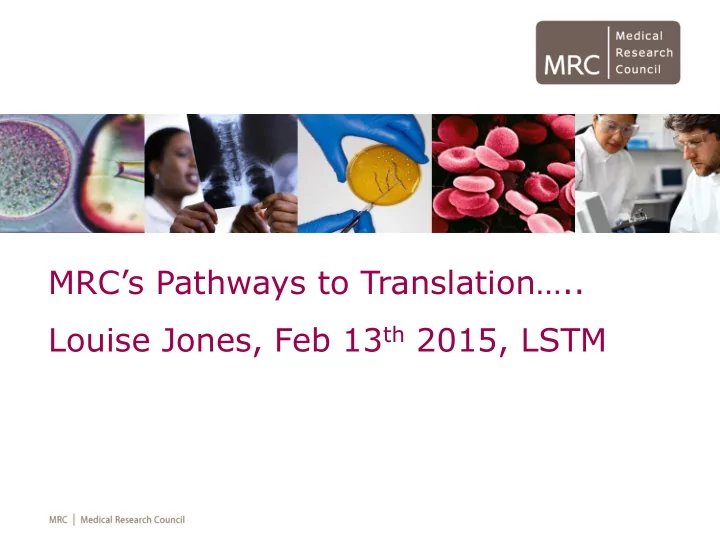

MRC’s Pathways to Translation….. Louise Jones, Feb 13 th 2015, LSTM
MRC Remit and Partners • MRC: basic research to early • Other funders/partners clinical trials • Department of Health / National Institute of Health Research (NIHR) • Underpinning and aetiological • Other Research Councils • Prevention • Medical Charities • Detection and diagnosis • Industry • Treatment development & evaluation • Innovate UK • Phase 1 & 2 trials Basic Early Late Discovery Preclinical HTA research Clinical Clinical MRC EME BBSRC NIHR Medical Charities Innovate UK
MRC and translation • MRC research expenditure • Discovery research ~75% • Translational and applied research ~25% • Strong discovery science and talented, flexible researchers underpin everything • Creative and reciprocal co-operation with industry • Partnerships to tackle complex fields • Public funding, project by project, to bridge the valley of death • Partnerships with Universities, charities, RCs and Innovate UK
MRC’s Translational Research Funding Innovate UK Efficacy, Biomedical Catalyst: DPFS BMC: BMC: Mechanism Health Translational Confidence Major and Technology Research in Awards Evaluation Assessment Support Concept Committee Programme Programme Biomedical Catalyst: RMRC Prototype Early Late Health Pre-clinical clinical Basic research discovery clinical Technology development trials & design trials Assessment MRC Lead NIHR Lead MRC/NIHR Methodology Research Programme Continued commitment to basic research BBSRC & EPSRC Medical Charities
MRC/Innovate UK Biomedical Catalyst • Four-year £210 million translational programme open to academia and SMEs, jointly funded & managed by MRC and Innovate UK • Three categories of grant: • Feasibility/Confidence in Concept, • Early-stage • Late-stage • Major Awards Committees (MAC) assess Early- and Late-stage proposals with commercial potential, DPFS assesses academic-led development proposals further from market • Industry-led applications are submitted via Innovate UK • Funding is available to academic partners from MRC at 80% • Academic-led applications for Early and Late-stage projects are made via the BMC: DPFS scheme.
Biomedical Catalyst: DPFS Biomedical Catalyst: DPFS BMC: BMC: Translational Confidence Major Research in Awards Support Concept Committee Biomedical Catalyst: RMRC What’s different?: • Not just ‘Translational Research Grants’ • Projects are goal oriented and milestone-based • Portfolio is actively managed • This allows MRC to provide a long-term commitment to inherently risky projects
BMC:DPFS In remit: • Development and pre-clinical testing of novel therapeutic entities, devices and diagnostics through to early-phase clinical studies (P1 to P2a) • “Repurposing” clinical studies – existing therapies in new indications Out of remit: • Discovery science including mechanistic studies and biomarker identification (MRC research boards) • Technology development where not aligned to a medical/clinical developmental plan (likely BBSRC or EPSRC remit) • Phase 2b and 3 clinical trials & trials of non-novel agent-disease combinations (NIHR) • Pre-clinical development and early clinical testing of novel regenerative medicine therapies is supported through the Regenerative Medicine Research Committee (£4m/year, deadlines 3 times/year).
What’s Important? Need Deliverability IP Rationale Downstream Support
BMC: DPFS - Historic Awards • As of February 2015, 169 projects have been supported with a total commitment of more than £145m: • (update figures below in red) • 94 therapeutic interventions including • 34 small molecule • 20 protein/peptide • 9 antibodies • 13 gene therapies • 29 diagnostics • 13 vaccines • 9 medical devices • 4 other
Confidence in Concept • Institutional awards of up to £1.2m over 18 months • Awards are intended to support multiple projects covering preliminary work or feasibility studies; projects decided by university. • Projects should be tightly defined, £50-100k in cost and lasting a maximum of 9 months • The aim is to accelerate the transition from discovery science to translational research i.e. to get projects to the point where they are well placed to seek funding for development (e.g. through DPFS) • Could be seen as equivalent to seed funding – infrastructure and a pipeline of projects should already be in place
Proximity to Discovery: Industry Engagement Fund A new funding scheme to support research organisations to use creative approaches to building relationships with industry partners. Support to allow RO to be proactive in developing new opportunities for collaboration. Enhance academic understanding of industry or vice versa Enabling universities to highlight opportunities for potential industry partners People exchanges to enhance skills, knowledge and understanding Exchanges are not expected to exceed 6 months Providing awards up to £250,000
Working in Partnership - Translational Opportunities • Stratified Medicine £60m over 4 years - funding for structured academic-industry disease consortia • Experimental Medicine Challenge Grants Significant investment since 2012/13 to support ambitious, challenge- led studies of disease mechanisms in humans. • MRC/AstraZeneca: Mechanisms of Disease initiative £10m to fund a unique initiative giving academic researchers access to deprioritised experimental assets from AstraZeneca.
New Opportunities MRC-Industry Asset Sharing Centre for Lead Discovery Initiative • Researchers will use a virtual • Access to AZ’s 1.9m screening library of compounds to collection and technology understand disease mechanisms platforms and explore treatment • MRC-funded scientists alongside opportunities. AZ researchers, working on MRC selected projects
The Team BMC: DPFS Dr Mark Pitman (mark.pitman@headoffice.mrc.ac.uk) Proteins, peptides, antibodies; EME • Dr Alex Pemberton (alexander.pemberton@headoffice.mrc.ac.uk) Small molecules, psychological/behavioural, cell & regenerative • medicine; Centre for Lead Discovery Dr Steve Oakeshott (stephen.oakeshott@headoffice.mrc.ac.uk) Diagnostics, medical devices, • Dr Catriona Crombie (catriona.crombie@headoffice.mrc.ac.uk) Gene therapy, siRNA, vaccines; Confidence in Concept • Dr Jo Latimer (jo.latimer@headoffice.mrc.ac.uk) Small molecules; Industry Asset Sharing Initiative • BMC: RMRC Dr Paul Colville-Nash (Paul.Colville-Nash@headoffice.mrc.ac.uk) Stratified Medicine Dr Jonathan Pearce (Jonathan.Pearce@headoffice.mrc.ac.uk) Experimental Medicine (& methodology) Dr David Crosby (David.Crosby@headoffice.mrc.ac.uk)
Recommend
More recommend